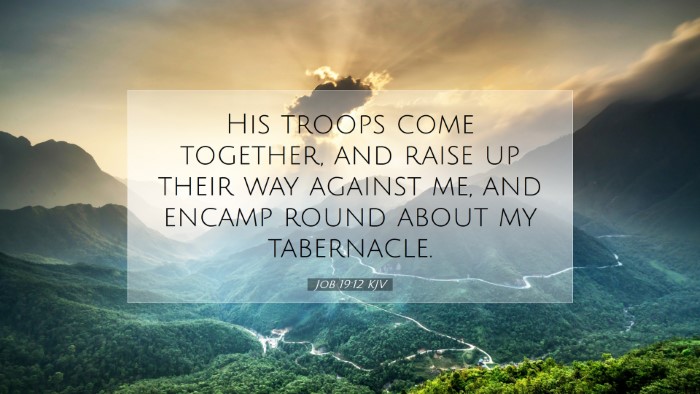Old Testament
Genesis Exodus Leviticus Numbers Deuteronomy Joshua Judges Ruth 1 Samuel 2 Samuel 1 Kings 2 Kings 1 Chronicles 2 Chronicles Ezra Nehemiah Esther Job Psalms Proverbs Ecclesiastes Song of Solomon Isaiah Jeremiah Lamentations Ezekiel Daniel Hosea Joel Amos Obadiah Jonah Micah Nahum Habakkuk Zephaniah Haggai Zechariah MalachiJob 19:12
Job 19:12 KJV
His troops come together, and raise up their way against me, and encamp round about my tabernacle.
Job 19:12 Bible Commentary
Commentary on Job 19:12
Job 19:12 (KJV): "His troops come together, And raise up their way against me, And encamp round about my tabernacle."
This verse encapsulates a moment of profound despair and isolation for Job, reflecting his feelings of abandonment and the external pressures he faces. In this commentary, we will explore the insights from various public domain commentaries, providing a comprehensive examination of the text for pastors, students, theologians, and Bible scholars.
Contextual Analysis
In the wider context of Job's speeches, particularly in chapters 19-21, Job expresses his deep anguish over his suffering and the perceived injustices he faces. At this juncture, Job has been surrounded by his friends, who, despite their initial intentions to comfort him, have become sources of further distress, chastising him for his supposed sins.
Matthew Henry's Insight
Matthew Henry notes that Job perceives his suffering as akin to a military siege. The use of military language—"troops" and "encamp"—suggests that Job feels under attack from all sides. This vivid imagery not only conveys his isolation but also emphasizes the relentless nature of his trials.
Henry also points out the emotional weight of Job’s predicament, indicating how the gathering of adversaries signifies the turning of friends into foes. He draws parallels between Job’s experience and that of the righteous believer who often faces heightened trials from both the external world and internal turmoil.
Albert Barnes' Perspective
Albert Barnes focuses on the metaphor of troops encamping around Job's "tabernacle," offering a poignant description of Job's once peaceful existence now turned into a battleground. Barnes interprets this "tabernacle" as a symbol of Job's life and your spiritual dwelling, which is now encircled by adversities and despair.
Barnes emphasizes the overwhelming nature of Job's circumstances. He points out that the reference to troops reflects Job’s trap — he is completely surrounded, with no avenue of escape or hope in sight. It serves as a reminder of the experience of many believers who, while feeling forsaken, must realize that God’s presence can still be found amidst such overwhelming adversity.
Adam Clarke's Thoughts
Adam Clarke engages with the text by analyzing the metaphor further. He suggests that the troops represent various sources of Job’s suffering, including loss, grief, and the accusations of his friends. Clarke notes that this encampment symbolizes both physical and spiritual assault, highlighting the intensity of Job’s emotional state.
According to Clarke, Job’s battle is both at a personal level and a cosmic one, illustrating the broader spiritual warfare that may occur when one is affected by trials. He posits that Job’s lamentation reflects a universal experience of feeling besieged by life's troubles.
Thematic Implications
The themes presented in Job 19:12 are rich with implications for understanding suffering, isolation, and the human condition in relation to divine justice.
- Suffering and Isolation: Job's sense of being marginalized resonates with those who feel abandoned during their trials. The imagery of being surrounded aids in understanding the depth of isolation one can feel.
- Divine Absence: Throughout the Book of Job, there is an exploration of God's silence amidst suffering. Job's statement embodies this conflict between his perception of God’s absence and his faith in God's ultimate justice.
- Perseverance of Faith: Despite the overwhelming sense of siege, Job continues to hope in a mediator and a redeemer. This points to the importance of steadfastness in faith, even when circumstances are dire.
Conclusion
Job 19:12 serves as a powerful reminder of the emotional turmoil that accompanies suffering. Through the insights gleaned from the commentaries of Matthew Henry, Albert Barnes, and Adam Clarke, we see a multifaceted interpretation of Job's distress. Be it through the metaphor of military encampment or the depiction of personal and cosmic battles, this verse deeply echoes the struggle of faith in the face of overwhelming adversity.
For pastors, this passage emphasizes the necessity of compassionate ministry to those who feel besieged. For students and scholars, it provides an in-depth theological exploration of suffering, justice, and faith. Ultimately, Job's experience invites us to reflect on our own faith journeys amidst the trials of life and to find hope even in the deepest despair.


